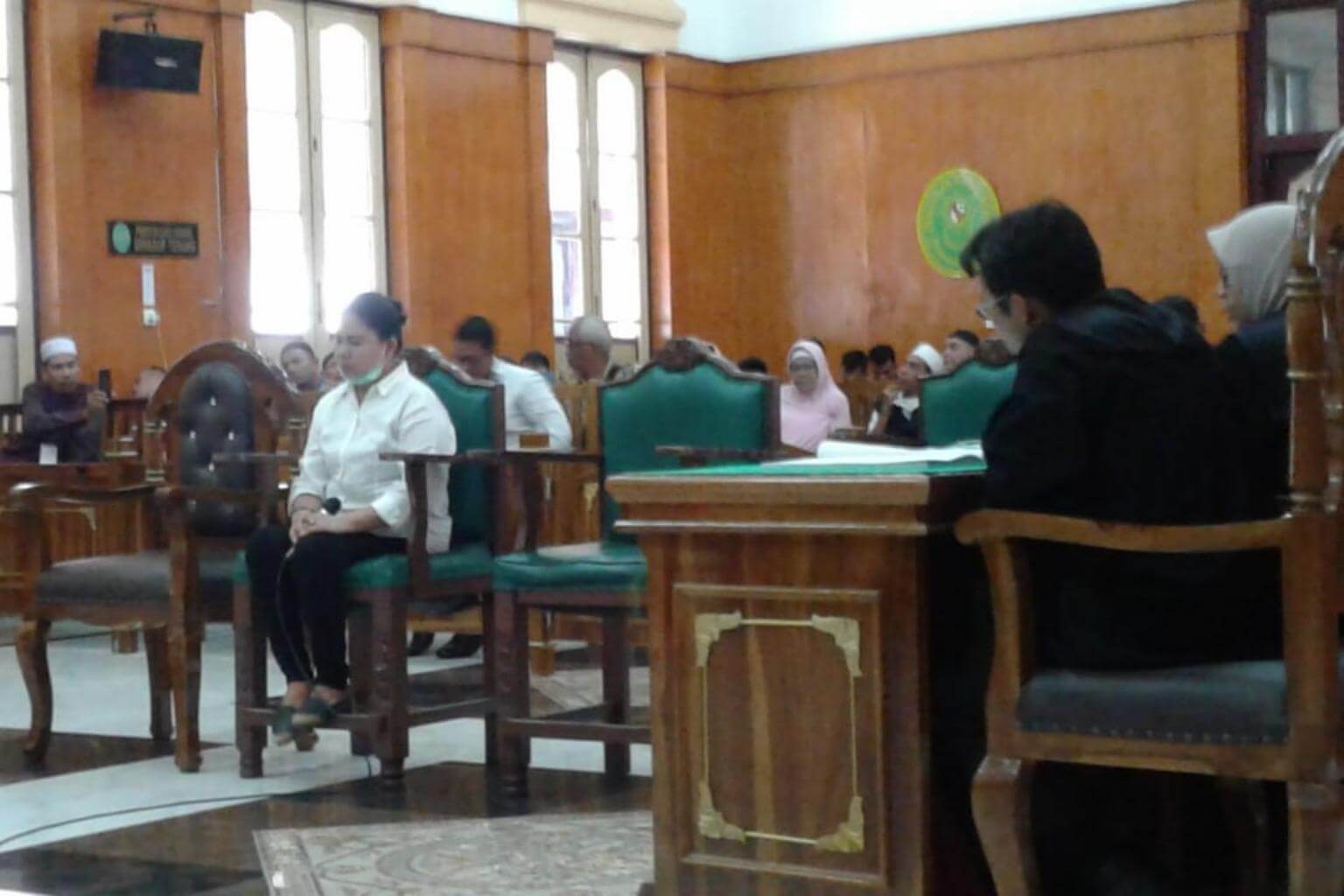Chinese-Indonesian woman imprisoned for complaining about 'adzan' volume, released on parole
Sign up now: Get insights on Asia's fast-moving developments

The Medan District Court found the woman (in white) guilty of blasphemy and sentenced her to 18 months in prison in August 2018.
PHOTO: THE JAKARTA POST/ASIA NEWS NETWORK
Follow topic:
JAKARTA (THE JAKARTA POST/ASIA NEWS NETWORK) - Meiliana, a Buddhist woman of Chinese-descent who was sentenced to 18 months in prison for complaining about the volume of adzan (call to prayer) in Tanjungbalai, North Sumatra, has been released on parole after the Law and Human Rights Ministry granted her request.
She was welcomed by her family and lawyer upon her release from the Tanjung Gusta Women's Penitentiary in Medan, North Sumatra, at around 11am on Tuesday (May 21).
"The Law and Human Rights Ministry granted Meiliana's parole request today, so Meiliana was automatically released today as well," Meiliana's lawyer Ranto Sibarani told The Jakarta Post on Tuesday.
He added that he had filed a request for Meiliana's parole to the ministry three weeks prior to her release.
Article 15 of the Criminal Code (KUHP) stipulates that inmates may be granted the right to request for parole after serving two-thirds of their prison term.
"Meiliana has served a year in prison, meaning that she has served more than two-thirds of her 18 month sentence," Ranto said.
The Medan District Court found Meiliana guilty of blasphemy under Article 156 and Article 156A of the KUHP and sentenced her to 18 months in prison in August 2018.
She was the first person to be sentenced to prison for complaining about the volume of a mosque's speakers. Her comment also triggered an anti-Chinese riot that saw Buddhist temples burned down in Tanjungbalai.
Meiliana said the adzan was "too loud" and that it "hurt" her ears in July 2016.
However, her comment was distorted in the following days, leading to rumors and provocative messages being spread on social media and messaging applications, with some even claiming that she wanted to ban the adzan, and that she had thrown rocks at the mosque and forcefully stopped prayers.
On the night of July 29, 2016, a mob started to throw rocks at Meiliana's house and ransacked nearby Buddhist temples. The riot proceeded until the next morning.
As a result, 14 Buddhist temples in Tanjung Balai were burned. No fatalities were reported in the incident but the financial losses were estimated to be in the billions of rupiah.
In January 2017, the North Sumatra chapter of the MUI issued a fatwa declaring that Meiliana's complaint was "demeaning and insulting toward Islam" because the adzan was part of Islamic law, leading the police to charge Meiliana with blasphemy later that month.
A year later, then-MUI chairman Ma'ruf Amin condemned the burning of the temples, adding that it was acceptable to lower the volume of the mosque's loudspeakers in respect for people in the neighborhood.
The police arrested 19 people for their role in the riot. Eight were charged with looting, nine with malicious destruction of property and two with inciting violence. All were given one to four month jail sentences.
Meiliana's blasphemy conviction, in stark contrast to those of the rioters, garnered worldwide attention and condemnation.
Executives from Indonesia's largest Muslim organizations, Nahdlatul Ulama (NU) and Muhammadiyah, criticised the conviction and called for a review of blasphemy-related articles and laws they deemed as "vague" and "an instrument to suppress freedom of expression".
The sentiment was shared by human rights group Amnesty International Indonesia, which called the decision ludicrous and a flagrant violation of freedom of expression.
The Institute for Criminal Justice Reform (ICJR) said her case showed once again that the blasphemy articles were used "to attack minority groups."
The Anti Discrimination Movement (Gandi) argued that Meiliana's statement was similar to comments made by Vice President Jusuf Kalla in 2015. Kalla, also the chairman of the Indonesian Mosque Council (DMI), criticized the overuse of mosque loudspeakers during Ramadan that year.
Despite the widespread support, Meiliana's appeal was rejected in October 2018 by the Medan High Court, with the decision upheld by the Supreme Court in April through a cassation verdict.
Despite Meiliana's release, Ranto said he was planning to file a case review to the Supreme Court to challenge the guilty verdict.

